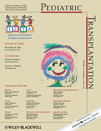
PEDIATRIC TRANSPLANTATION
Scope & Guideline
Pioneering discoveries in pediatric transplantation for tomorrow's health.
Introduction
Aims and Scopes
- Pediatric Organ Transplantation:
The core focus is on the various aspects of organ transplantation in children, including liver, kidney, heart, and multi-organ transplants. - Clinical Outcomes and Complications:
Research on the short-term and long-term outcomes of pediatric transplant recipients, including complications such as rejection, infections, and late effects of transplantation. - Immunosuppression Strategies:
Studies investigating different immunosuppression regimens, their effectiveness, and their impact on graft survival and patient health. - Psychosocial Aspects of Transplantation:
Exploration of the psychological and social factors affecting pediatric transplant patients and their families, including adherence to treatment and quality of life. - Innovative Techniques and Technologies:
Research and development of new techniques in transplantation, such as minimally invasive surgical methods, and the use of advanced monitoring technologies. - Ethical and Policy Issues:
Discussion of ethical considerations, disparities in access to transplantation, and policies affecting pediatric organ donation and transplantation.
Trending and Emerging
- Personalized Medicine in Transplantation:
Growing emphasis on tailoring immunosuppression and treatment plans based on individual patient characteristics, including genetic and environmental factors. - Use of Technology in Monitoring:
Increased research into the utilization of digital health tools, remote monitoring, and telehealth solutions to improve patient outcomes and adherence. - Psychosocial Interventions:
An emerging focus on the psychological well-being of pediatric transplant patients, including studies on mental health interventions and support systems. - Vaccination and Infectious Disease Management:
Heightened attention to vaccination strategies and managing infectious diseases, particularly in the context of COVID-19 and its impact on immunocompromised pediatric populations. - Multidisciplinary Approaches to Care:
A trend towards collaborative care models that integrate various specialties to address the complex needs of pediatric transplant recipients. - Ethics and Access to Transplantation:
Increased exploration of ethical considerations and disparities in access to transplantation, particularly in underserved populations.
Declining or Waning
- Traditional Immunosuppression Protocols:
There has been a noted decline in research focused on conventional immunosuppression protocols as newer, more targeted therapies gain attention. - Single-Organ Transplant Studies:
Research specifically focusing on single-organ transplants, such as isolated kidney or liver transplants, has decreased in favor of studies exploring multi-organ transplantation. - Historical Cohort Studies:
The prevalence of studies relying on historical cohorts for data has waned, as there is a shift towards more contemporary, real-time data analysis methodologies. - Longitudinal Studies Without New Interventions:
Research that does not incorporate new interventions or technologies has seen less engagement, with a preference for studies that assess new treatments or techniques. - General Pediatric Health Studies:
There is a reduction in publications that broadly address pediatric health issues outside of transplantation, as the focus tightens on transplantation-specific outcomes.
Similar Journals
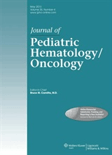
JOURNAL OF PEDIATRIC HEMATOLOGY ONCOLOGY
Enhancing understanding, improving outcomes for young patients.JOURNAL OF PEDIATRIC HEMATOLOGY ONCOLOGY, published by Lippincott Williams & Wilkins, serves as a vital platform for the dissemination of cutting-edge research and insights in the fields of pediatric hematology and oncology. Since its inception in 1979, the journal has maintained a commitment to advancing knowledge through peer-reviewed articles that contribute to the understanding and treatment of blood disorders and cancers in children. With an impact factor reflective of its academic contributions, the journal is positioned in the Q3 quartile across key medical categories — Hematology, Oncology, and Pediatrics, Perinatology and Child Health — indicating its relevance and influence in the field. While it does not currently offer open access options, the journal remains a crucial resource for researchers, clinicians, and students dedicated to improving pediatric care and outcomes. Researchers are encouraged to contribute to this esteemed journal as it seeks to bridge the gap between clinical practice and research, fostering innovation and improved quality of life for young patients affected by hematologic and oncologic conditions.

Transplantation and Cellular Therapy
Empowering Discoveries in Cell Biology and Molecular Medicine.Transplantation and Cellular Therapy is a leading journal published by Elsevier Science Inc, dedicated to advancing the fields of transplantation, immunology, cell biology, and molecular medicine. With its ISSN of 2666-6375 and E-ISSN 2666-6367, this journal serves as a vital resource for researchers, practitioners, and students aiming to stay at the forefront of innovative therapies and clinical practices in transplantation. As of 2023, it holds an impressive Q1 ranking in multiple categories, including Cell Biology, Hematology, Immunology and Allergy, Molecular Medicine, and Transplantation, reflecting its high impact and relevance in the scientific community. The journal, operating from its base in the Netherlands, supports Open Access publishing to enhance the dissemination and accessibility of groundbreaking research. Acknowledging the significance of transplantation and cellular therapies in modern medicine, Transplantation and Cellular Therapy is poised to propel future discoveries and developments in these critical domains.

Progress in Transplantation
Advancing the Future of Organ TransplantationProgress in Transplantation is a leading journal published by SAGE Publications Inc, focusing on the dynamic field of transplantation medicine. With an ISSN of 1526-9248 and E-ISSN 2164-6708, this journal serves as a crucial platform for researchers and clinicians aiming to share cutting-edge findings and advancements in organ transplantation. Despite not being an Open Access journal, it provides a significant contribution to the academic community, evidenced by its placement in the Q3 category of Transplantation for 2023 and its ranking of #33 out of 54 in Scopus, showcasing a percentile standing of 39th. Progress in Transplantation has been dedicated to publishing high-quality research since its inception in 2000, and it continues to be a vital resource for those seeking to enrich their knowledge and foster innovation within the field of transplantation, fostering collaboration among practitioners, researchers, and students alike.

Transplantation Direct
Bridging Knowledge Gaps in Organ TransplantationTransplantation Direct is a leading open access journal in the field of transplantation, published by the prestigious Lippincott Williams & Wilkins. Since its inception in 2015, the journal has provided a vital platform for the dissemination of high-quality research and advancements related to organ transplantation. With an impact factor that places it in the Q2 category among transplantation journals, it ranks #22 out of 54 in the Medicine - Transplantation Scopus classification, reflecting its significance and authority within the discipline. The journal not only covers a broad scope of topics related to transplantation but also encourages global collaboration and knowledge exchange amongst researchers, clinicians, and students. With its open access model, Transplantation Direct ensures that groundbreaking findings are accessible to a wider audience, fostering innovation and enhancing patient care worldwide. For more information, visit their address at TWO COMMERCE SQ, 2001 MARKET ST, PHILADELPHIA, PA 19103.
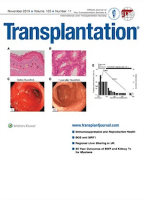
TRANSPLANTATION
Uncovering Insights for a Brighter Transplant Future.TRANSPLANTATION is a premier journal in the field of organ transplantation, published by Lippincott Williams & Wilkins, that has been a cornerstone of transplantation research since its inception in 1963. With an impressive impact factor cementing its status, this journal is categorized in the top quartile (Q1) of its field, currently ranking 6th out of 54 in the Scopus Medicine Transplantation category, placing it in the 89th percentile. The journal publishes original research, clinical studies, and reviews that significantly advance our understanding of transplantation science, ensuring that professionals, researchers, and students remain informed of the latest developments. Although it is not an open-access journal, it offers valuable insights that contribute to enhancing practice and improving outcomes in transplantation medicine, making it an essential resource for anyone involved in this dynamic and impactful discipline.

Current Transplantation Reports
Fostering Innovation in Transplantation PracticesCurrent Transplantation Reports, published by SpringerNature, is a leading journal in the field of transplantation science, offering vital insights into the cutting-edge developments in transplant medicine and related disciplines. With an impressive array of quartile rankings, including Q2 in Nephrology and Transplantation, and Q3 in Hepatology and Immunology for 2023, this journal plays a significant role in bridging research and clinical practice. Focused on fostering innovation, the journal spans a wide spectrum of topics, from surgical advances to immunological considerations of transplant procedures. It serves as an invaluable resource for researchers, healthcare professionals, and students interested in the latest advancements and data in transplantation, recognizing the importance of disseminating knowledge in this evolving field. Although currently not designated as Open Access, it provides rigorous peer-reviewed articles that contribute to the academic community's understanding of transplantation scenarios and challenges faced in clinical settings.
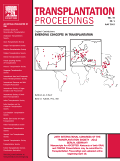
TRANSPLANTATION PROCEEDINGS
Bridging Discoveries and Clinical Excellence in Transplantation.TRANSPLANTATION PROCEEDINGS is a distinguished journal published by Elsevier Science Inc, focused on the field of transplantation and surgery. With a publication history spanning over five decades, from 1969 to 2024, this journal has consistently provided a platform for researchers and practitioners to share significant findings and advancements in organ transplantation and related surgical techniques. The journal is renowned for its rigorous peer-review process and has achieved a respectable impact factor within its categories, ranking in the Q3 quartile for both Surgery and Transplantation as of 2023. With Scopus rankings placing it in the 47th percentile in Medicine (Surgery) and the 43rd percentile in Medicine (Transplantation), TRANSPLANTATION PROCEEDINGS serves as a vital resource for academics and medical professionals seeking to stay updated on the latest empirical research, clinical practices, and innovative methodologies in the field. While it does not operate under an open-access model, the journal ensures that critical insights and data are accessible to its audience, enhancing the global discourse in transplantation science. For those dedicated to advancing transplant medicine, this journal represents an invaluable collection of knowledge and a forum for fostering innovative approaches to improve patient outcomes.
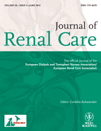
Journal of Renal Care
Enhancing patient care with rigorous scholarly dialogue.The Journal of Renal Care, published by Wiley, stands as a leading scholarly platform for researchers, healthcare professionals, and students dedicated to advancements in nephrology and specialized nursing practices. With an impact factor that reflects its high degree of influence in the field—ranking in the Q1 category for Advanced and Specialized Nursing and Q2 for Nephrology based on 2023 metrics—it serves as an essential resource for innovative research and clinical insights. The journal's ISSN (1755-6678) and E-ISSN (1755-6686) facilitate easy access to cutting-edge studies and reviews that have shaped the scope of renal care since its inception in 2006, with a converged publication span extending until 2024. Addressing the pressing challenges within nephrology, this journal fosters a stimulating academic environment, enhancing the quality of patient care through rigorous peer-reviewed research and dialogue. As it continues to contribute significantly to both nursing and medical disciplines, the Journal of Renal Care remains a pivotal source for nurturing knowledge and advancing practice in renal healthcare.
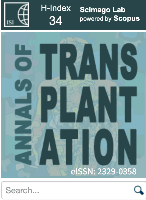
Annals of Transplantation
Advancing the Future of Transplantation MedicineAnnals of Transplantation is a renowned academic journal published by INT SCIENTIFIC INFORMATION, INC, dedicated to the field of transplantation medicine. With a strong historical presence since its inception in 1996, this journal continues to provide a vital platform for disseminating innovative research, clinical studies, and review articles that contribute significantly to the ever-evolving landscape of organ transplantation. Holding a respectable Q2 ranking in the field of transplantation and a Q3 ranking in broader medicine categories as of 2023, the journal stands out with an impactful repository of knowledge that caters to a diverse audience, including researchers, healthcare professionals, and students. While it currently does not operate under an open access model, the scholarly contributions within are crucial for advancing practices, policies, and outcomes in transplantation. Whether you are seeking to keep abreast of recent advances or looking to publish your own findings, Annals of Transplantation serves as an essential resource for fostering collaboration and innovation in medical science.
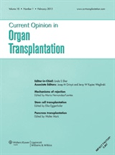
Current Opinion in Organ Transplantation
Elevating Knowledge in Organ TransplantationCurrent Opinion in Organ Transplantation, published by Lippincott Williams & Wilkins, serves as a leading journal in the fields of immunology and transplantation, providing insightful reviews and expert opinions that shape the discourse in these vital areas of medical research. With an impact factor showcasing its significance and influence in the academic community, this journal is ranked in the Q2 category for both Immunology and Transplantation according to the 2023 metrics, affirming its essential role in advancing knowledge and understanding. Spanning from its inception in 2001 through to 2024, Current Opinion in Organ Transplantation offers a platform for researchers, professionals, and students to engage with the latest advancements and trends, contributing to the ongoing dialogue that drives innovation in organ transplantation and immunological therapies. Although the journal does not currently offer open access options, its rigorous peer-review process and reputable publisher ensure the highest quality of research dissemination, making it an invaluable resource for those invested in the future of organ transplantation.